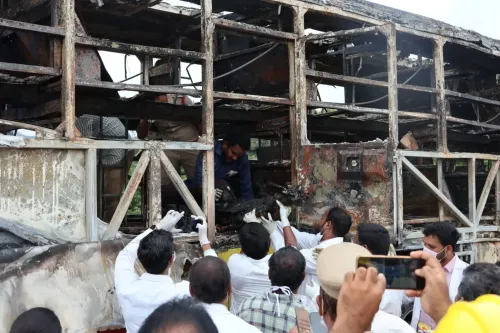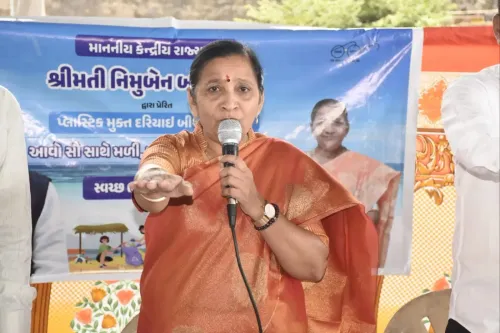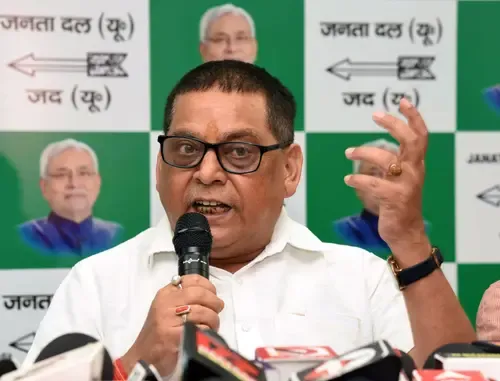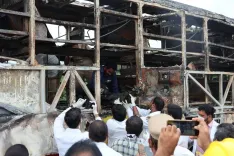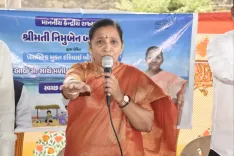Karnataka: Six Maoists Lay Down Arms in Presence of Chief Minister Siddaramaiah
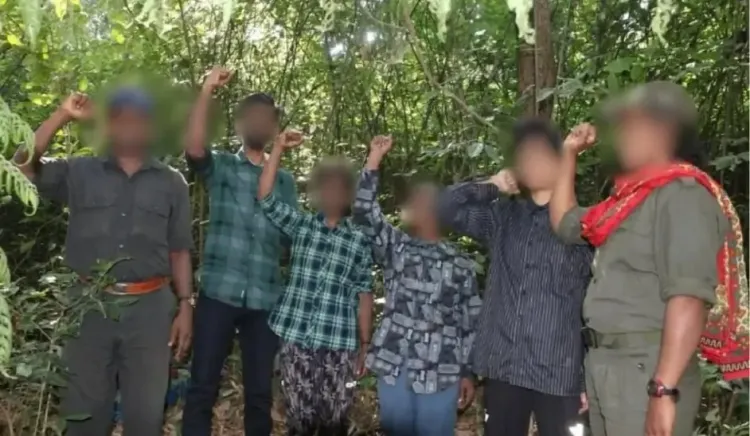
Bengaluru, Jan 8 (NationPress) Six Maoists have surrendered in the presence of Karnataka Chief Minister Siddaramaiah at his residence office ‘Krishna’ in Bengaluru on Wednesday, expressing their commitment to rejoin society by laying down their arms.
The arms surrender ceremony was attended by Karnataka Home Minister G. Parameshwara and Deputy Chief Minister D.K. Shivakumar. The Karnataka Director General of Police and several senior officials from the police department were also present.
The Maoists were transported to the Chief Minister's office from Chikkamagaluru. Earlier in the day, they had sought to surrender to the district administration of Chikkamagaluru via the ‘Shantigaage Naagarikara Vedike’ (Citizens Forum for Peace).
However, upon the request of CM Siddaramaiah to expedite the surrender process, they were brought to Bengaluru.
Among those who surrendered were Mundagaru Latha from Mundagaru in Sringeri, Vanajakshi from Balehole in Kalasa, Sundari from Kutluru near Mangaluru, Marappa Jayanna Aaroli from Raichur, Vasantha T. (alias Ramesh) from Tamil Nadu, and N. Jeesha from Kerala.
Sources indicate that Mundagaru Latha, the eldest daughter of a low-income tribal family from Sringeri Taluk, left school in the 6th grade due to poverty and mistreatment from teachers. Her family reportedly faced the risk of losing their home due to the Kudremukh National Park Project.
Disillusioned by the government’s alleged disregard for peaceful protests, Latha and her family aligned with the movement opposing the project.
At 18 years old in 2000, frustrated by the lack of action from authorities regarding peaceful protests, Latha resorted to armed resistance.
Since then, she has been part of a guerrilla faction operating across Karnataka and Kerala. Over time, she has returned to mainstream activism, re-emerging as a significant figure in democratic movements.
Sources assert that despite only having completed the 6th grade, Latha exhibits extraordinary insight and dedication when discussing policies and their impact. She was acknowledged as a leader in the Maoist faction and is now committed to advocating for justice for marginalized communities through democratic channels.
Sundari, another tribal woman, was raised in poverty as the sixth child among five siblings and had to leave school after the 3rd grade due to financial constraints and the school’s distance from her home.
Her family, too, reportedly faced potential displacement due to the Kudremukh National Park Project. When peaceful protests did not yield results, Sundari, like many young individuals at the time, resorted to armed struggle.
In 2004, at 19, she joined the Maoist party and became part of a guerrilla group operating in Karnataka and Kerala.
She recalls the police raids and violence inflicted upon her and neighboring families, memories that continue to haunt her.
Despite these challenges, Sundari claims to have maintained her resilience and now aims to reintegrate into society and contribute to democratic movements for social reform.
Vanajakshi, the senior-most member of the group, completed her education up to the SSLC (10th grade). She discontinued her studies in 1985 and became actively involved in her village’s public life, having served as an unopposed member of the Gram Panchayat in both 1992 and 1997.
As the eldest daughter in a family of eight children, she acquired skills in typewriting and supported her family through tailoring.
Despite her political activism, Vanajakshi and her family were unable to safeguard their modest land from influential individuals, leading to her mother’s mental health decline and her brother’s tragic suicide.
Sources report that witnessing similar hardships faced by other families in her community led Vanajakshi to lose faith in the system. Influenced by the armed movements of the time, she resolved in 2000 that armed resistance was the only viable path.
Since then, she has been part of a guerrilla group operating throughout Karnataka and Kerala.
Jayanna Aaroli, a Dalit youth from Aaroli village in Manvi Taluk of Raichur district, holds a Bachelor’s degree. During his college years, he was drawn to the Maoist movement that was active in the region. The police killing of Bhaskar, a key figure in the movement, profoundly affected him and fueled his determination to join the cause.
As part of the government’s rehabilitation initiative, Jayanna has pledged to allocate half of the financial compensation he is set to receive towards the development of the school in his village, according to sources.
Vasantha, a B.Tech graduate from Arcot in Vellore district, Tamil Nadu, grew up influenced by socially conscious ideologies and movements. Observing various struggles from a young age, he developed a strong inclination toward activism.
After completing his degree in 2010, Vasantha joined the armed struggle and became a member of a guerrilla group operating in Kerala and Karnataka.
Jeesha, an Adivasi woman from Makkimala in Wayanad district, Kerala, is the youngest member of the group.
She completed her education up to the 8th grade before engaging in the armed struggle in Kerala in 2018. In 2023, Jeesha relocated from Kerala to Karnataka with other group members, as per sources.

